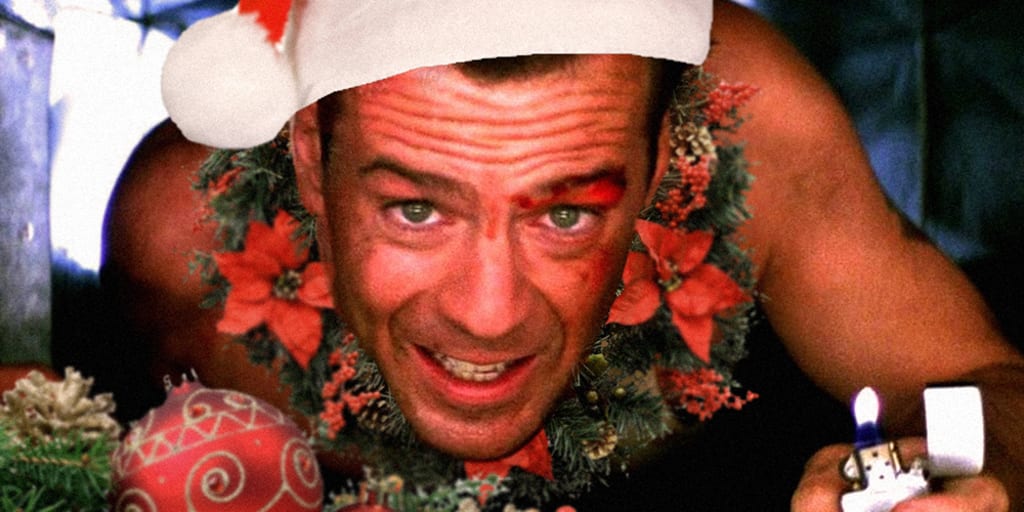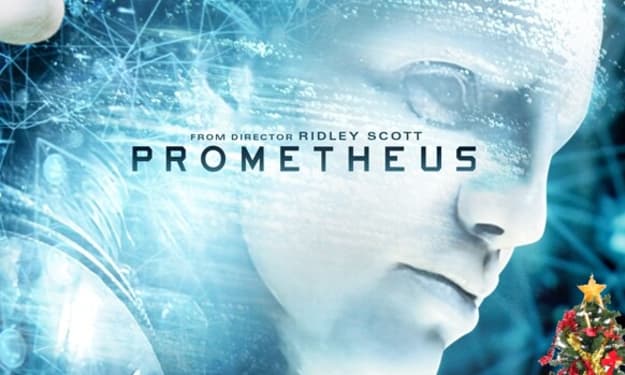4 Reasons Why 'Die Hard' Is Basically 'A Christmas Carol'
...With Guns.

The Christmas season is a time for love and acceptance, for peace and joy, for gifts and gift-giving. It is a happy time that you are able to spend with the people you love when you can enjoy each other’s company somewhere cozy, sipping hot chocolate, and singing Christmas Carols. It is a time of relaxation, when you get to curl up with a holiday movie to watch mindless Christmas brainwashing with those who have gathered around you. However, there is an insidious secret debate that has been taking over Christmas, an all out, bloody war between loved ones, family members, friends, strangers, and Facebook creepers. A debate that has been raging since 1988: Is Die Hard a Christmas movie?
I recently saw a clever Facebook meme that says: “There are two kinds of people in this world: Those that think Die Hard is a Christmas movie, and those that are wrong.” In my house, it’s no secret that some night in December, when the kids are tucked into bed, the wife and I will break out Die Hard and be regaled by the loud explosions, bloody deaths, and Christmas themes and undertones. Now, some of you may say that Die Hard is just an action movie that takes place at Christmas and doesn’t really have anything to do with the season. Well, friend, you may want to sit down, because you’re about to blow your mind like a group of Eurotrash thief/terrorists blow-up a modern skyscraper.
John McClane and Hans Gruber are two halves of the same Scrooge.
“Oh! but he was a tight-fisted hand at the grindstone, Scrooge! A squeezing, wrenching, grasping, scraping, clutching, covetous old sinner!”
Ebenezer Scrooge, the main character of Dickens’ A Christmas Carol, had a troubled past. He was sent away to boarding school at a young age (not uncommon for the time). We are given the impression that he spent all of his time in that school, but we know for sure that he never returned home for the holiday breaks. This does come to an end when he is rescued by his younger sister, Fan. In a short interaction between the two we learn that their father is “much kinder now,” indicating that he was unkind before. Perhaps their father is even more unkind than leaving his child alone in a school for months and years on end. All the same, physical discipline was a product of Dickens’ 1843, much like John McClane smoking in an airport or carrying a gun on a plane was a product of the 1980s.
Despite a small reprieve in which we see Scrooge’s interactions with his first employer, the joyous and happy Mr. Fezziwig, who treated him as good as a son, Scrooge’s past remains quite sad with the next episode coloured by interactions with his unhappy fiancé, Belle. While Scrooge courting a young lady is as unappealing as seeing your parents make out at this point in the book, it appears that he managed. Belle, a gold digger with a heart, can’t handle sharing Scrooge’s love with coin and cash and she leaves his rich ass (toppling his stack of coins in the process). Scrooge doesn’t seem care though; he has his money after all. In reality he’s a cold, lonely, and unhappy man which is emphasized by a past with those same attributes. And yet, he can’t move on and doesn’t see a reason to.
“I’m a New York cop. I got a six-month backlog on New York scumbags I’m still trying to put behind bars. I can’t just pick up and go that easy.”
Much like Scrooge, Det. John McClane is stuck in a past where he feels wronged. While we don’t hear much about this past, we get subtle hints throughout the movie. We know he’s been a New York cop for eleven years, and he’s dedicated to his job, but, despite the dedication, he tends to bend rules or colour outside the lines. We know this through his interaction with Tony (blond terrorist #1, or brother of longhaired blond terrorist) before he drops him down a set of stairs and breaks his neck.
“Tony: ’There are rules for policemen.’McClane: ‘Yeah. That’s what my captain keeps telling me.’”
As a cop, McClane feels like he is getting shit on from all sides. The criminals he has to arrest, the paperwork that continually build up, and his superiors that tell him to follow the rules and toe the line. Add to that his issues with his wife, and he has had a pretty rough recent past.
Speaking of his wife, and I’ll speak on this more later, McClane actually chose his job over love! Sound familiar? Yeah, I thought so. In other news, 2+2 = 4. Yep, Scrooge and McClane have a lot in common when you really look at it. Though McClane is decidedly more giving than the old miser, but the same can’t be said for his nemesis, his antithesis, Hans Gruber.
“Well, when you steal six hundred dollars, you can just disappear. When you steal six hundred million, they will find you, unless they think you’re already dead.”
Hans Gruber, perennial top five on best cinematic villains lists, isn’t a terrorist. He’s a thief. A very good thief, in fact, despite the horribly convoluted plan he comes up with to rob six hundred million. The problem with being a thief is that greed normally comes along with it, and Hans has it in spades, just like our friend Scrooge. Money is all that is on Gruber’s mind, his plan to hold hostage and kill Nakatomi plaza employees proves that, but it’s in his throw away comments that it is solidified. Comments about his classical education and John Phillips suits let us know that Hans is a man used to luxury, while his actions tell us that he is willing to kill to get more of it. Sure, Scrooge and McClane gave up love for their jobs, but Hans would line it up and shoot it in the head to keep/ get his money. That’s cold man, cold.
Holly Genaro is Bob Cratchitt.
“That’s okay. I’m eyeing his private bathroom.”
As much as Bob Cratchitt is a hardworking father of five who brings home crumbs to his family, Holly Genaro is a hardworking mother of two who brings home the bacon for her family. Cratchitt can barely provide for his family, while Holly apparently makes quite a bit of money and is one of the leaders of the Nakatomi Corporation after Takagi and Ellis. Of course, where they really differ is in their love lives. Cratchitt has a supportive and loving family waiting for him at home, while Holly is at odds with her husband and they’ve been separated for weeks, if not months or years.
Bob is poor financially, Holly is poor in her heart and, as different as that is, it is also their point of comparison. Bob is happy in his situation because he works hard and has his family. Holly works hard, but doesn’t work as diligently on her relationship (a task shared with McClane to be certain). Holly is forced to ask herself if her work is actually worth it without closure around John and their marriage. She invites John to spend Christmas with her and the kids in an effort to reach this closure, just as Cratchitt’s desire for an extra piece of coal will help him in his situation. John, like Scrooge, doesn’t help in this of course. He’s stuck being butthurt about his past and his place in it, so much so that he overlooks any recognition that Holly receives from work. Instead, he focuses on the deficits that the job presents to them (him) including: how she dropped his last name, how she wanted him to uproot, and how Ellis may have amorous feelings for her.
Bob and Holly are two sides of the same coin, and arguably that’s where their problems come from. Bob gets paid too little, Holly paid too much. In either case, it has had some detrimental effects on their families and their family lives.
The Ghosts of Christmas Past, Present, and Future are all there!
“‘I am here to-night to warn you, that you have yet a chance and hope of escaping my fate. A chance and hope of my procuring, Ebenezer.... You will be haunted,’ resumed the Ghost, ‘by Three Spirits.’”
Okay, okay. I know this seems like a stretch. But is it really? No, it’s not. All three Ghosts are represented in this modern retelling of A Christmas Carol. You ready to have your mind blown?
“Would you so soon put out, with worldly hands, the light I give? Is it not enough that you are one of those whose passions made this cap, and force me through whole trains of years to wear it low upon my brow!”
“The fire has been called off, my friend. No one is coming to help you. You might as well come out and join the others. I promise I won’t hurt you.”
The Ghost of Christmas Past is represented by Tony Vreski (blond terrorist #1). He leads John McClane’s Scrooge down memory lane as everything related to their interaction (fight) is related to McClane’s past. For starters, John calls the police, which is what brings Tony running (who names a Swedish/Norwegian kid with blond hair and blue eyes Tony?) in the first place. John is a cop; it’s who he is and was. It’s a call back to his first instinct to have the good ole boys in blue help him out of this situation. Later, when he lands a sweet elbow on Tony’s dome, he mentions his captain, referring to the fact that he has had a troubled (but perhaps successful) career that was plagued by his inability to follow policemen rules. When Tony finally dies from a broken neck, McClane claims his gun leading to one of the most iconic scenes in the movie (Now I have a machine gun, ho-ho-ho). This, of course, leads back to his police training or even his military training. Yeah, I said military training. No, there is no mention of military training in the movie, but John McClane has a very specific (if small) tattoo on his left bicep. A tattoo that we know (from other movies like Lethal Weapon) is only shared amongst those who were members of the Army Special Forces. So, yeah, he has military training. In the military they use machine guns, so he would know how to use them. Judging by the timing of the movie, his time in the army may have seen him in the Vietnam war, so, perhaps, the whole move is actually one giant post traumatic stress-induced hallucination. Maybe all those terrorists he’s killing are other patients or orderlies in some psychiatric hospital. Maybe they’re other vets at the annual Vet Christmas Party! Now that’s a Christmas movie I’d watch!
“They are Man’s... and they cling to me, appealing from their fathers. This boy is Ignorance. This girl is Want. Beware them both, and all of their degree, but most of all beware this boy, for on his brow I see that written which is Doom, unless the writing be erased. Deny it!”
“You a dog now. Where you going pal? Soon there will be no more table... Next time you have a chance to kill someone, don’t hesitate.”
The Ghost of Christmas Present is represented by the two mad bombers of the movie – Marco and Heinrich. Why? Well, it’s because everything that happens in relation to their interaction with McClane forces him to deal with the situation that is happening in the present. While John McClane has already been a “fly in the ointment” for the terrorists, this really brings things to a head when we know McClane is going to be the one to take care of the problem. First, he finally manages to get the local police involved by dropping Marco out the window (and on to Sgt. Al Powell’s car). Second, he has killed a few of Gruber’s henchmen at this point, making him more of a threat to Gruber and his plans because he has Heinrich’s detonators. Third, Gruber has to focus on McClane now, has to focus on the present which means John has to spend the majority of the movie dealing with the situation he has been thrown into.
“The Phantom slowly, gravely, silently, approached.... in the very air through which this Spirit moved it seemed to scatter gloom and mystery.... It was shrouded in a deep black garment, which concealed its head, its face, its form, and left nothing of it visible save one outstretched hand.”
“I don’t want neutral. I want dead.”
The last ghost, and the scariest of them all, the Ghost of Christmas Future, is represented in Die Hard by the big bad Karl Vreski. This one is a little more simple to follow: When all is said and done, when John McClane has overcome the present, learned from his past, and is ready to move on into the future with his wife, Karl is still there. Karl, who should’ve died along with McClane’s past that he’s held on to so tightly up to this point, comes back. Comes back to remind McClane that his past can come back, that Karl could be McClane if he doesn’t truly move on, if he continues to hold on to those grudges from his past. Luckily for Holly, and the rest of us, McClane has learned from his past. This is a new McClane, one that doesn’t resort to violence and is only focused on loving and protecting his neglected wife – Powell can take care of Karl.
Tiny Tim is their Marriage.
“I see a vacant seat,” replied the Ghost, “in the poor chimney-corner, and a crutch without an owner, carefully preserved. If these shadows remain unaltered by the Future, the child will die.”
In the Dickens’ classic, Tiny Tim is the crippled, delicate, and quintessential example of the poor and sick in 1843 London. In the 1980s McTiernan/ Willis classic, the sick and crippled are represented in the state of the McClane marriage.
Admittedly, the marriage of John and Holly is not as shiningly positive as Tiny Tim, but it is certainly in a poor and sickly condition at the beginning of the movie. There is some positive there, and Holly invites John out to California to get together and have a few laughs, she offers him a place to stay so that he can see the kids, and, really, they’ll all get to spend time together. This is similar to the pleasant trip Bob Cratchitt and Tiny Tim take to church and back during Scrooge’s travels with the Ghost of Christmas Present. McClane, like Scrooge, seems to be cheered by these gestures, even if it is momentarily.
Of course, John is still harbouring a lot of negative toward his estranged wife and their situation. After all, she had a good job that turned into a great career, but he didn’t think she was going to make it, thought that she’d come crawling back to him. That didn’t happen. Then there was another stab for poor, wounded John in that Holly has started using her maiden name once more, leaving the McClane name in New York. This causes the only argument we see the two have in the movie, but it reveals so much. The tension and strife in the relationship are made apparent in that argument: that she left without closure, that they don’t agree on the direction their marriage has taken, that they miss one another, that something needs to change. Here their marriage stands on the razor’s edge. Luckily, the events of the movie bring about an unspoken resolution (probably in the form of John saving Holly’s life).
Just as the ghostly visits to Scrooge were unpleasant to him, John and Holly’s predicament during the fall of Nakatomi Tower were harrowing to them. In both cases, however, lessons were learned for the better. Scrooge becomes a better man. He is able to hold Christmas in his heart and think about the good will of all mankind. John and Holly are also changed in that they recognize the value of their marriage and their love for one another is renewed... at least until Die Hard with a Vengeance.
So, next Christmas, don’t feel any guilt or worry as you huddle up in front of the television with your loved ones and watch Hans Gruber fall out of Nakatomi Plaza. It’s a Christmas movie after all, and at least it wasn’t a hostage that fell.






Comments
There are no comments for this story
Be the first to respond and start the conversation.